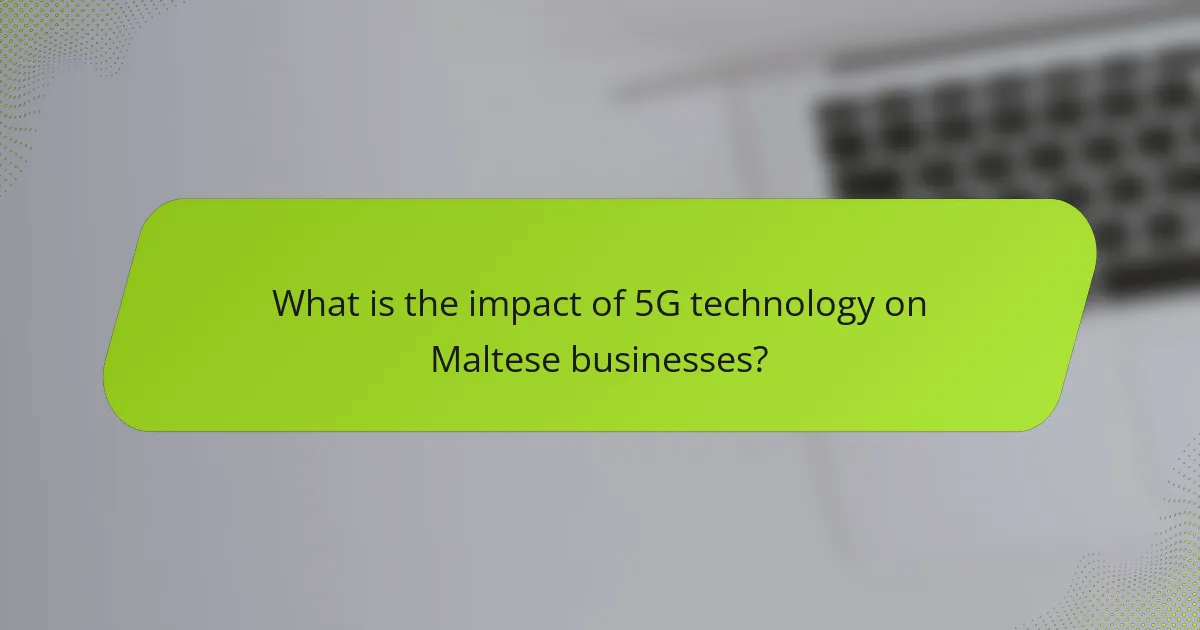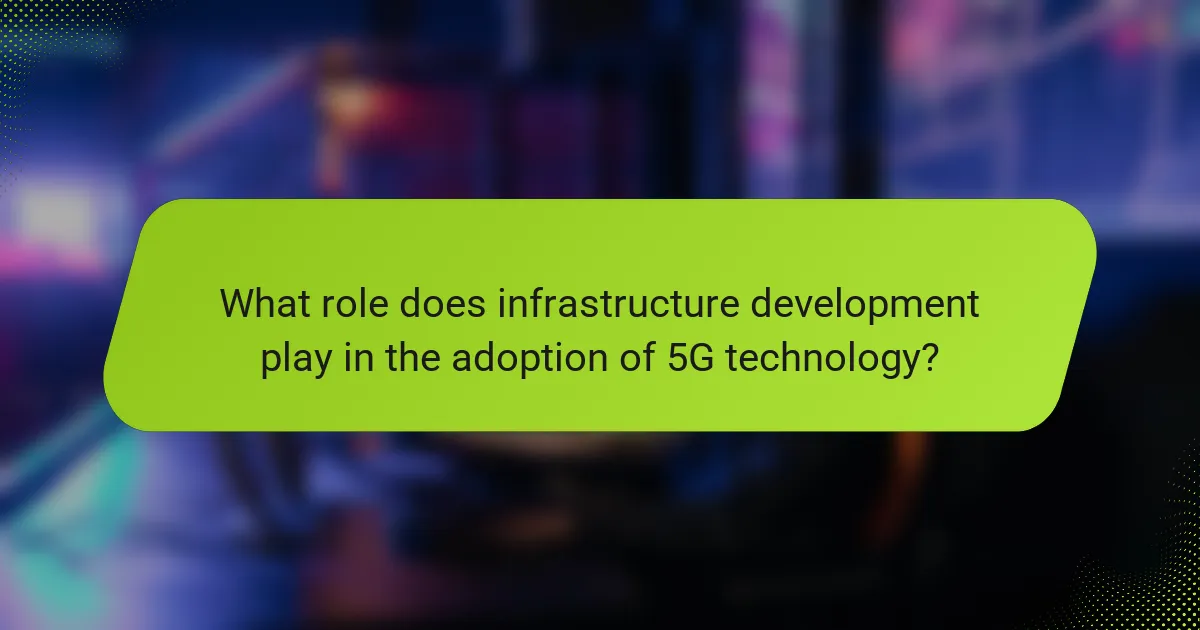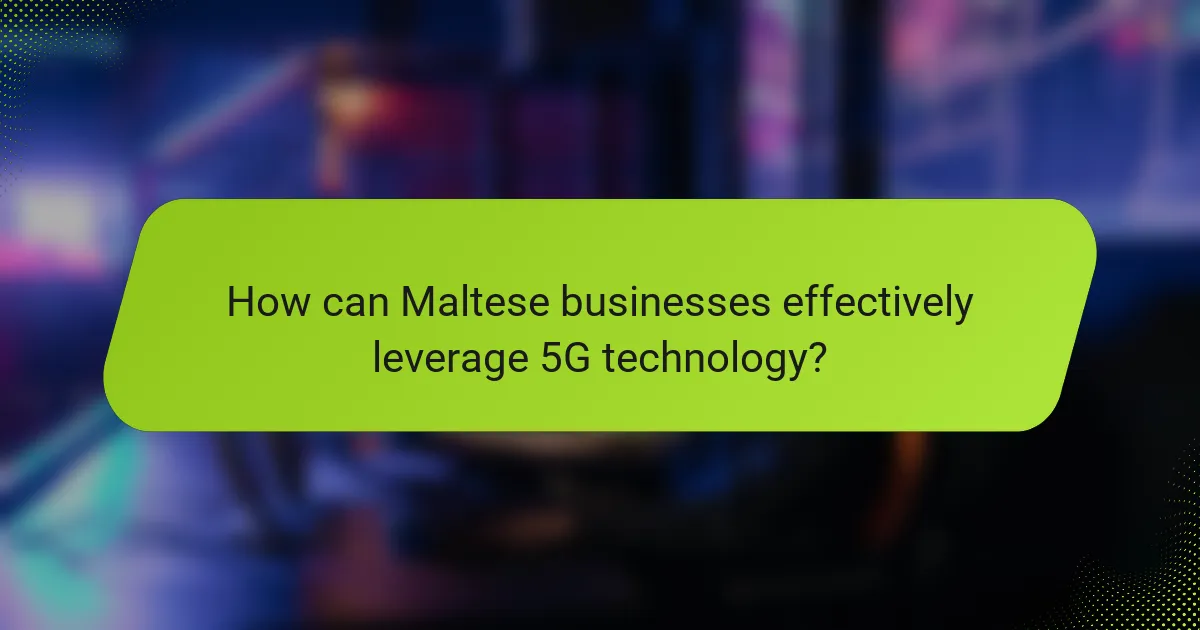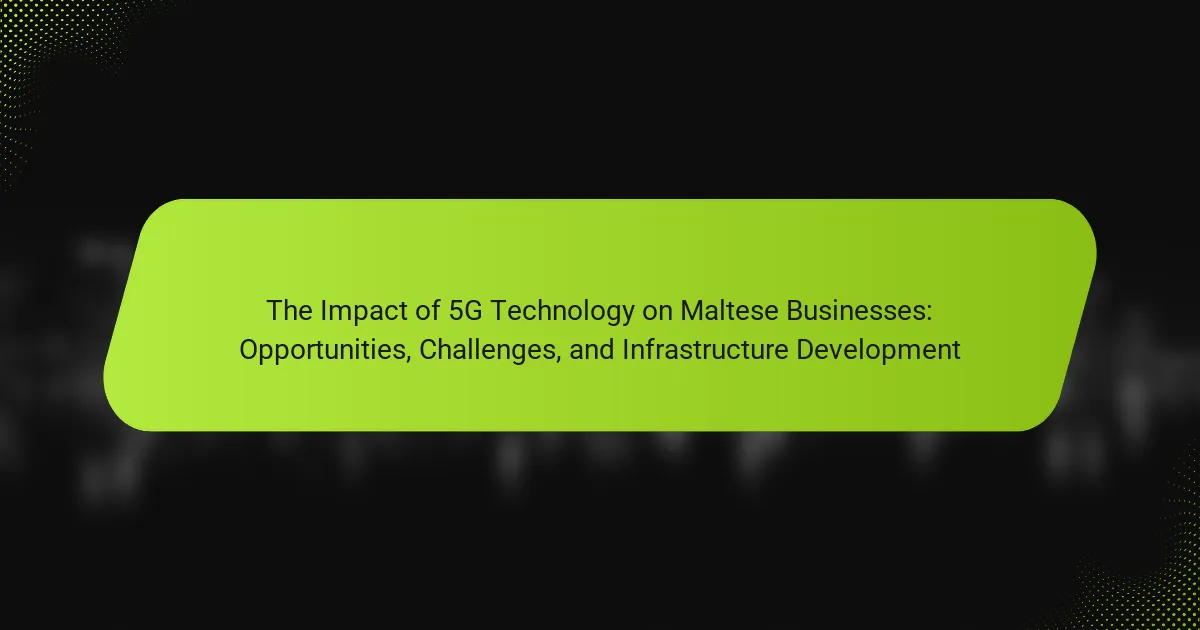
What is the impact of 5G technology on Maltese businesses?
5G technology significantly enhances Maltese businesses by improving connectivity and enabling faster data transfer. This technology allows for real-time communication and collaboration. Enhanced mobile broadband supports applications like telemedicine and remote work. The low latency of 5G benefits industries such as manufacturing and logistics. Increased capacity can accommodate more devices, fostering innovation. According to a report by the Malta Communications Authority, 5G can boost productivity and economic growth. Maltese businesses can leverage 5G for competitive advantages in various sectors.
How does 5G technology differ from previous generations?
5G technology differs from previous generations primarily in its speed, capacity, and latency. It offers download speeds up to 10 Gbps, significantly faster than 4G’s maximum of 1 Gbps. 5G supports a higher number of connected devices, enabling up to 1 million devices per square kilometer. This is a substantial increase compared to 4G, which supports around 100,000 devices per square kilometer. Additionally, 5G reduces latency to as low as 1 millisecond, while 4G typically has a latency of 30-50 milliseconds. These advancements allow for improved real-time applications, such as remote surgery and autonomous vehicles. Overall, 5G’s enhancements in speed, capacity, and latency mark a significant evolution in mobile communication technology.
What are the key characteristics of 5G technology?
5G technology is characterized by high speed, low latency, and massive connectivity. High speed allows data transfer rates up to 10 Gbps, significantly faster than 4G. Low latency reduces response times to as little as 1 millisecond, enabling real-time communication. Massive connectivity supports up to 1 million devices per square kilometer. Enhanced capacity improves network efficiency and user experience. Network slicing allows for tailored services for different applications. These characteristics enable advancements in IoT, smart cities, and autonomous vehicles. 5G’s potential is backed by ongoing global infrastructure investments and technological developments.
How does 5G technology enhance connectivity for businesses?
5G technology enhances connectivity for businesses by providing significantly faster data speeds and lower latency. It enables real-time communication and data transfer, which is crucial for various applications. Businesses can utilize 5G for improved remote work capabilities and enhanced collaboration tools. The technology supports a higher number of connected devices, facilitating the Internet of Things (IoT) integration. This allows for smarter operations and automation in various sectors. According to a report by Ericsson, 5G can deliver speeds up to 100 times faster than 4G. This improvement fosters innovation and efficiency, driving business growth in competitive markets.
What opportunities does 5G technology present for Maltese businesses?
5G technology presents significant opportunities for Maltese businesses. It enables faster data transfer speeds, enhancing communication and operational efficiency. Businesses can leverage low latency to improve real-time data processing. This technology supports the Internet of Things (IoT), allowing for smarter automation and resource management. Enhanced connectivity can boost innovation in sectors like healthcare, tourism, and manufacturing. According to a report by the European Commission, 5G can contribute up to €113 billion to the EU economy by 2025. This indicates a substantial economic potential for Malta as well. Furthermore, 5G can facilitate remote work and cloud-based services, improving flexibility and productivity.
Which sectors in Malta stand to gain the most from 5G technology?
Telecommunications, healthcare, and tourism sectors in Malta stand to gain the most from 5G technology. The telecommunications sector will benefit from faster data speeds and improved connectivity. This can enhance mobile services and broadband access. The healthcare sector can utilize 5G for telemedicine and remote patient monitoring. This leads to improved patient outcomes and efficiency in healthcare delivery. The tourism sector can leverage 5G for enhanced visitor experiences. This includes augmented reality applications and improved communication services. According to a report by the European Commission, 5G can enhance economic growth across various sectors. This indicates significant potential for Malta’s economy with 5G implementation.
How can 5G technology drive innovation in Maltese enterprises?
5G technology can drive innovation in Maltese enterprises by enabling faster data transfer and improved connectivity. This technology supports real-time communication and data exchange. Enhanced speed and lower latency facilitate advanced applications such as IoT and AI. Maltese businesses can leverage these advancements for automation and efficiency. For example, manufacturing processes can be optimized through connected machinery. Additionally, 5G allows for the development of smart cities and enhanced customer experiences. Research indicates that 5G can boost GDP by up to 1.5% in regions that adopt it effectively. The implementation of 5G infrastructure in Malta can attract foreign investment and foster a competitive business environment.
What challenges do Maltese businesses face with the implementation of 5G technology?
Maltese businesses face several challenges with the implementation of 5G technology. High infrastructure costs are a significant barrier, as upgrading networks requires substantial investment. Limited technical expertise within local firms hampers effective deployment and utilization of 5G capabilities. Regulatory hurdles also pose difficulties, as compliance with new guidelines can slow down the rollout process. Additionally, concerns about cybersecurity and data privacy increase apprehension about adopting 5G. The need for compatible devices and equipment further complicates the transition, as many existing technologies may not support 5G. Finally, the potential for uneven coverage across the islands raises concerns about equitable access to 5G services. These challenges collectively hinder the seamless integration of 5G into the Maltese business landscape.
What are the potential costs associated with adopting 5G technology?
The potential costs associated with adopting 5G technology include infrastructure investment, equipment upgrades, and operational expenses. Infrastructure investment can reach billions of dollars for network deployment. Equipment upgrades may require businesses to replace existing hardware to be compatible with 5G. Operational expenses can increase due to the need for specialized personnel and maintenance. Additionally, regulatory compliance costs may arise from meeting new standards. According to a report by the GSMA, the global economic impact of 5G could be around $2 trillion, reflecting the scale of investment required.
How can businesses address security concerns related to 5G?
Businesses can address security concerns related to 5G by implementing robust cybersecurity measures. They should conduct comprehensive risk assessments to identify vulnerabilities in their networks. Regular software updates and patch management are essential to protect against emerging threats. Additionally, businesses should deploy end-to-end encryption for data transmitted over 5G networks. Training employees on security best practices can reduce human error risks. Collaborating with trusted vendors for secure hardware and software solutions is also crucial. According to a report by the European Union Agency for Cybersecurity, 5G networks present unique security challenges that require proactive strategies. Implementing these measures can significantly enhance security in a 5G environment.

What role does infrastructure development play in the adoption of 5G technology?
Infrastructure development is crucial for the adoption of 5G technology. It provides the necessary physical framework for 5G networks to function effectively. This includes the installation of new cell towers and advanced fiber-optic cables. These components enhance network coverage and data transmission speeds. According to the GSMA, countries with robust infrastructure see faster 5G rollout. Additionally, infrastructure investment supports the integration of Internet of Things (IoT) devices. This integration is essential for maximizing 5G’s potential in various industries. Thus, without significant infrastructure development, the widespread adoption of 5G technology would be severely hindered.
How is the current infrastructure in Malta prepared for 5G technology?
Malta’s current infrastructure is actively being upgraded for 5G technology. The Maltese government has initiated a national strategy to facilitate 5G deployment. This includes regulatory measures to streamline the installation of necessary equipment. Telecommunications companies in Malta are investing in new infrastructure to support faster data speeds. Fiber optic networks are being expanded to enhance connectivity. Additionally, the existing mobile networks are being modernized to accommodate 5G frequencies. Testing of 5G technology has already been conducted in various urban areas. These efforts collectively prepare Malta for a robust 5G environment.
What upgrades are necessary for existing infrastructure to support 5G?
Upgrades necessary for existing infrastructure to support 5G include enhancing network density, upgrading backhaul systems, and implementing small cell technology. Network density must increase to accommodate more connections per square kilometer. This requires additional cell sites and antennas to ensure coverage and capacity. Upgrading backhaul systems is crucial for handling increased data traffic. Fiber optic connections are often needed for faster data transmission. Small cell technology facilitates better coverage in urban areas. It allows for the deployment of low-power nodes that connect to the main network. Additionally, existing hardware must be upgraded to support new frequency bands used by 5G. These upgrades are essential to meet the demands of high-speed data and low latency required by 5G applications.
How can public-private partnerships facilitate infrastructure development?
Public-private partnerships (PPPs) can facilitate infrastructure development by combining resources and expertise from both sectors. These collaborations leverage private sector efficiency and innovation to enhance public infrastructure projects. PPPs can also attract investment, reducing the financial burden on governments. For example, the World Bank reports that PPPs can mobilize up to 50% more in infrastructure investment compared to traditional public funding alone. Additionally, PPPs often lead to faster project delivery due to streamlined processes. This efficiency is crucial for meeting the growing demands of 5G technology in Malta. By fostering collaboration, PPPs can effectively address infrastructure gaps and support the digital transformation of businesses.
What are the implications of 5G infrastructure on local economies?
5G infrastructure positively impacts local economies by enhancing connectivity and enabling new technologies. It supports faster internet speeds and lower latency. This improvement fosters innovation in various sectors, including healthcare, education, and transportation. Local businesses can leverage 5G for improved operational efficiency. Enhanced connectivity attracts investments and stimulates job creation. According to a report by IHS Markit, 5G could contribute $13.2 trillion to the global economy by 2035. This growth extends to local economies through increased productivity and new market opportunities. 5G also enables smart city initiatives, improving urban living standards. Overall, 5G infrastructure is a catalyst for economic development at the local level.
How can improved connectivity influence economic growth in Malta?
Improved connectivity can significantly influence economic growth in Malta by enhancing business efficiency and attracting investment. Faster internet speeds and lower latency enable businesses to operate more effectively. This leads to increased productivity and innovation within various sectors. Enhanced connectivity supports the growth of digital services and e-commerce, which are vital for Malta’s economy. According to a report by the European Commission, countries with advanced digital infrastructure experience higher GDP growth rates. Improved connectivity also facilitates better access to global markets, allowing Maltese businesses to expand internationally. Moreover, it encourages the development of smart technologies and services, contributing to sustainable economic growth.
What impact does 5G infrastructure have on job creation in Malta?
5G infrastructure positively impacts job creation in Malta. The deployment of 5G technology facilitates new business opportunities. It enables advancements in sectors such as telecommunications, healthcare, and manufacturing. These advancements create demand for skilled professionals in these industries. According to a report by the GSMA, 5G could contribute over €1 billion to Malta’s economy by 2030. This economic growth is likely to lead to thousands of new jobs. Additionally, 5G infrastructure supports innovation and entrepreneurship. This further enhances the job market by fostering startups and tech companies.

How can Maltese businesses effectively leverage 5G technology?
Maltese businesses can effectively leverage 5G technology by adopting enhanced connectivity and real-time data processing. 5G provides faster internet speeds and lower latency, enabling improved customer experiences. Businesses can use 5G for IoT applications, enhancing automation and efficiency. This technology supports advanced analytics, allowing for better decision-making based on real-time data. Additionally, 5G can facilitate remote work and collaboration through improved communication tools. The deployment of 5G in Malta is backed by investments in infrastructure, ensuring reliable access. According to the Malta Communications Authority, 5G coverage is expected to expand significantly, providing further opportunities for businesses.
What strategies should businesses adopt to maximize the benefits of 5G?
Businesses should adopt strategies that leverage the high-speed and low-latency capabilities of 5G. They should invest in infrastructure upgrades to support 5G technology. This includes enhancing network security and ensuring compatibility with existing systems. Training employees on 5G applications is crucial for maximizing productivity. Collaborating with technology partners can facilitate innovative solutions. Developing new products that utilize 5G features can create competitive advantages. Implementing data analytics tools will help in making informed business decisions. Finally, businesses should continuously evaluate and adapt their strategies to keep pace with evolving 5G technologies.
How can companies integrate 5G into their existing operations?
Companies can integrate 5G into their existing operations by upgrading their network infrastructure. This includes installing 5G-compatible hardware and software. They should also assess their current systems for compatibility with 5G technology. Training staff on new technologies is essential for smooth integration. Companies can leverage 5G’s low latency for real-time data processing. This enhances applications such as IoT and remote monitoring. Additionally, partnerships with telecom providers can facilitate access to 5G networks. Research indicates that businesses adopting 5G can increase operational efficiency by up to 30%.
What best practices should be followed for a successful 5G rollout?
Successful 5G rollout requires strategic planning and collaboration. First, stakeholders must engage in thorough network planning. This includes assessing coverage areas and identifying potential obstacles. Next, partnerships with local governments are essential for obtaining necessary permits. Additionally, investing in infrastructure is crucial. This includes fiber optics and small cell deployment to enhance connectivity.
Moreover, implementing robust cybersecurity measures is vital to protect the network. Training staff on new technologies ensures smooth operations. Continuous testing and optimization of the network improve performance. According to a report by the GSMA, successful rollouts have seen a 20% increase in operational efficiency.
What are the common pitfalls to avoid when adopting 5G technology?
Common pitfalls to avoid when adopting 5G technology include underestimating infrastructure requirements. Businesses often overlook the need for extensive upgrades to existing networks. Another pitfall is failing to assess the total cost of ownership. This includes not just deployment costs but also ongoing maintenance and operational expenses. Additionally, neglecting to consider security implications can lead to vulnerabilities. Many organizations do not implement adequate cybersecurity measures during the transition. Another issue is inadequate training for staff on new technologies. Without proper training, employees may struggle to utilize 5G effectively. Lastly, businesses may rush the adoption process without a clear strategy. This can result in misaligned goals and wasted resources.
How can businesses mitigate risks associated with 5G implementation?
Businesses can mitigate risks associated with 5G implementation by conducting thorough risk assessments. This involves identifying potential vulnerabilities in their networks and operations. They should also invest in robust cybersecurity measures to protect sensitive data. Employee training on 5G technologies is crucial to ensure proper usage. Collaborating with experienced vendors can provide valuable insights and support. Additionally, businesses should develop contingency plans for potential service disruptions. Regularly updating infrastructure and software can prevent compatibility issues. Engaging with regulatory bodies ensures compliance with legal standards. These strategies collectively enhance resilience against 5G-related risks.
What lessons have been learned from other regions implementing 5G?
Regions implementing 5G have learned several key lessons. Infrastructure investment is crucial for successful rollout. Countries like South Korea and China have demonstrated that early investment leads to widespread adoption. Collaboration between government and private sectors accelerates deployment. For instance, the U.S. saw faster implementation through partnerships between telecom companies and local governments. Consumer education is essential to maximize benefits. Regions that engaged users effectively reported higher satisfaction rates. Addressing security concerns early on mitigates risks. Cybersecurity measures were prioritized in Europe, leading to safer networks. Lastly, flexibility in technology standards can enhance interoperability. Lessons from Europe showed that adaptable frameworks support diverse applications.
What future trends should Maltese businesses anticipate with 5G technology?
Maltese businesses should anticipate enhanced connectivity and faster data transfer with 5G technology. This will enable real-time data analytics and improve operational efficiency. Businesses can expect increased adoption of Internet of Things (IoT) devices, leading to smarter operations. Enhanced mobile broadband will support advanced applications such as augmented reality and virtual reality. The reduction in latency will facilitate remote work and telecommuting solutions. Companies in sectors like healthcare and manufacturing will benefit from improved automation and remote monitoring capabilities. According to the Malta Communications Authority, 5G is projected to significantly boost the local economy by enhancing digital services and infrastructure.
How might 5G technology evolve in the coming years?
5G technology is expected to evolve significantly over the coming years. Enhanced data speeds and reduced latency will be key features. The introduction of 5G standalone networks will improve performance. Increased connectivity for IoT devices will drive innovation in various sectors. Network slicing will enable customized services for different applications. This evolution will support advancements in smart cities and autonomous vehicles. According to a report by Ericsson, global 5G subscriptions are projected to reach 3.5 billion by 2026. This growth will stimulate economic opportunities and infrastructure development in regions like Malta.
What emerging technologies could be enhanced by 5G in Malta?
Emerging technologies that could be enhanced by 5G in Malta include the Internet of Things (IoT), augmented reality (AR), and autonomous vehicles. 5G technology offers low latency and high data speeds. This enables real-time data transmission for IoT devices. In Malta, smart city applications could benefit significantly from improved connectivity. AR applications in tourism and education can deliver immersive experiences with 5G. Autonomous vehicles require reliable communication for safety and efficiency. The enhanced bandwidth of 5G supports the high data demands of these technologies. Overall, 5G can accelerate the adoption and effectiveness of these innovations in Malta.
The main entity of the article is 5G technology and its impact on Maltese businesses. The article outlines how 5G enhances connectivity, speeds up data transfer, and supports real-time communication, benefiting various sectors such as telecommunications, healthcare, and tourism. It discusses the key characteristics of 5G, including high speed, low latency, and massive connectivity, while also addressing the challenges Maltese businesses face, such as infrastructure costs and cybersecurity concerns. Additionally, the article highlights the opportunities presented by 5G for innovation and economic growth, alongside necessary infrastructure developments and strategies for effective adoption.
